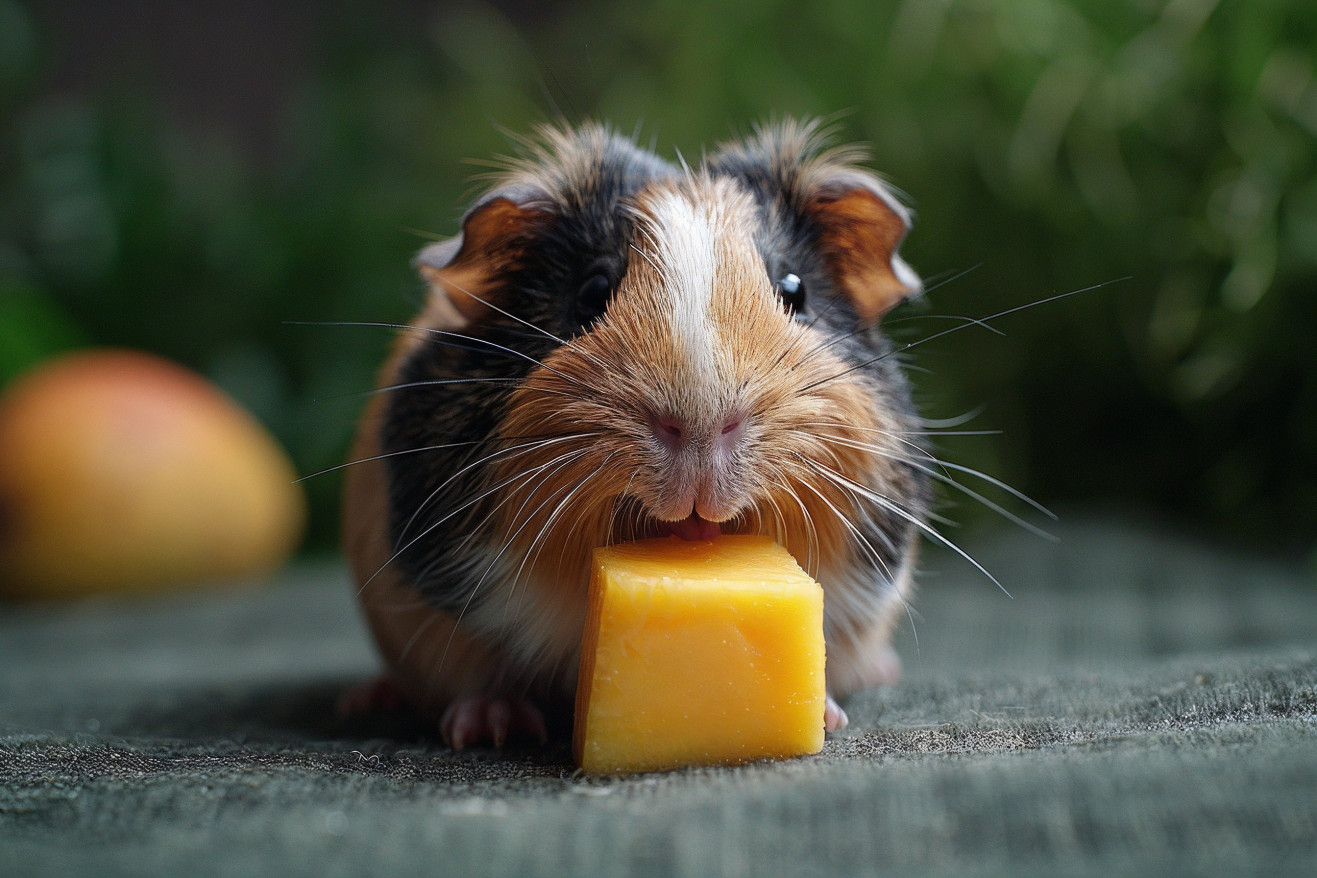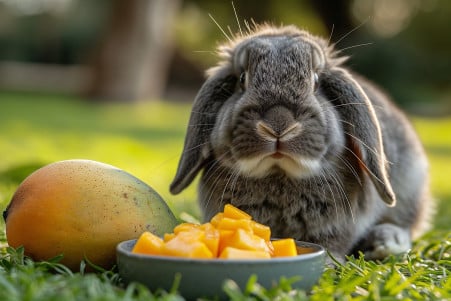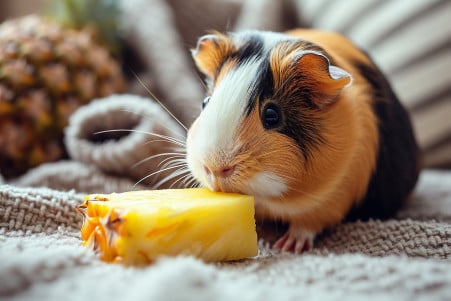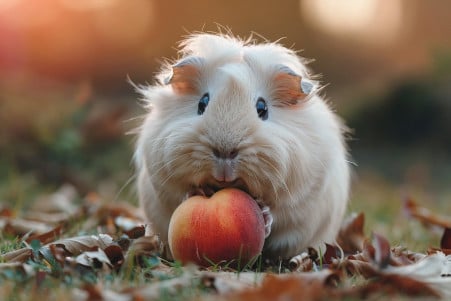Can Guinea Pigs Eat Mango? Safe Serving Tips and Nutrition Facts
18 February 2024 • Updated 18 February 2024

Mangoes are delicious tropical fruits that may sound like a healthy option for your guinea pig, but are they really good for them? While guinea pigs can eat mango, it should be in moderation. Mango is high in Vitamin C but it’s also high in sugar, so it’s best to stick to a small one-inch cube no more than twice a week.
Eating too much mango can cause problems for your guinea pig. As with any new food, make sure to introduce mango to your guinea pig’s diet slowly.
This in-depth article will take a deep dive into the most recent veterinary research and nutritional recommendations to explain the pros and cons of adding fruits like mango to a guinea pig’s diet.
It will also look at research on guinea pig dietary requirements, sugar metabolism, and the specifics of their digestive system to determine how an occasional treat can be part of their diet. This will help you understand how to create a diet that supports your pet’s health.
Can guinea pigs eat mango?
Necessary Nutrition for Healthy Guinea Pigs
Guinea pigs need a diet that is high in fiber, vitamins, and minerals, and they also need to get Vitamin C from their diet since they can’t produce it themselves. A lack of Vitamin C can lead to scurvy, which can be fatal for guinea pigs, according to the PDSA.
Fresh hay and grass provide guinea pigs with the fiber they need, which is important for their digestive and dental health since their teeth grow continuously, according to the RSPCA.
That said, while mangoes offer important nutrients like Vitamin C, their high natural sugar content means they should be fed to guinea pigs as an occasional treat. FOUR PAWS International recommends a diet for guinea pigs that includes hay, fresh grass, and a small selection of fruits.
As a result, while mangoes’ nutritional content meets some of guinea pigs’ dietary requirements, it’s important to feed them in moderation to support their well-being and avoid the problems that come with consuming too much sugar.
The Bottom Line: Can Guinea Pigs Eat Mango?
The dietary choices we make for our pets can have a major impact on their health. For example, studies have shown that guinea pigs can develop conditions like dyslipidemia due to a diet high in fat and sugar, which is similar to a condition in humans and can lead to diabetes as well as liver, heart, and kidney damage, according to PubMed.
This is especially important because, like humans, guinea pigs are unable to synthesize their own Vitamin C and can develop a number of health issues if their diet is not properly managed.
Keeping an eye on sugar intake is important to avoid diabetes in guinea pigs, which can lead to symptoms like increased thirst, weight loss, and potential kidney damage, according to GuineaPiggles.
As a result, while mangoes are a source of Vitamin C, their sugar content means they should only be a small part of a guinea pig’s diet. Instead, the bulk of their diet should be made up of high-fiber hay, fresh vegetables, and high-quality pellets, with treats like mangoes kept to a minimum.
Understanding the guinea pig’s digestive system is important when it comes to making sure they get the right mix of nutrients without overloading them with sugar. A diet that meets their specific nutritional needs while avoiding too much sugar is important for their overall health and happiness.
How the Digestive System of a Guinea Pig Works
The guinea pig’s specialized digestive system is designed to break down fibrous plant material. At the heart of the digestive system is the caecum, a microbial fermentation chamber that enables the digestion of fibrous materials.
As Supreme Petfoods explains, the microbes in the caecum ferment the food, breaking it down to release nutrients that the guinea pig can then absorb in the form of caecotrophs – special pellets that guinea pigs produce and then eat to get essential nutrients like vitamins B and K.
Hay, which should make up 80% of the guinea pig’s diet, is important for maintaining the guinea pig’s dental health and digestive function. It helps keep the guinea pig’s teeth worn down and provides the fiber needed to keep the digestive system moving. However, Guinea Lynx’s nutrition charts warn that feeding too much of the sugary fruit, including mango, can disrupt this balance and lead to an overgrowth of bad bacteria.
If you notice diarrhea or a loss of appetite in your guinea pig, it could be a sign that something is wrong with their digestive system, and you should evaluate their diet and possibly seek veterinary care. As a result, it’s important to feed mango in moderation to protect the health of this sensitive digestive system.
Mango Allergies in Guinea Pigs
Although guinea pigs can eat mango, it’s important to note that there is a possibility of food allergies, which can cause vomiting, diarrhea, and sneezing. If your guinea pig is experiencing any of these symptoms, PetCosset recommends that you contact your vet, as these are signs of an allergic reaction to mango or another food.
Mangoes are rich in nutrients like Vitamin A and antioxidants, which can help boost the immune system and fight free radicals. However, in some cases, these nutrients can cause allergic reactions in guinea pigs that are sensitive.
Be sure to introduce mango to guinea pigs slowly. Start by giving them a small piece of mango and see how they react.
This is especially important when you consider the fact that mango contains mangiferin. While research on mangiferin is ongoing, it has been found to have health benefits and potential allergenic properties.
As pet parents, it’s important to weigh the nutritional benefits against the small chance of allergies to make sure our pets can reap the benefits of mango without any negative side effects. Keep an eye on them and make sure you’re willing to make changes to their diet to ensure their health and well-being.
Mindful Mango Munching: Navigating Food and Medication Interactions for Guinea Pigs
If you want to feed your guinea pig mango, it’s important to think about the medications your guinea pig may be taking.
For example, mangiferin, a compound in mangoes, has been shown to have an impact on the nitric oxide–cyclic GMP pathway, which is responsible for relaxing smooth muscles.
A study in PubMed has shown that mangiferin can impact biological pathways that are affected by some medications that guinea pigs may be taking. If you want to give your guinea pig mango and they’re on medication, it’s important to talk to your vet to make sure that the mango won’t interact with the medication.
This is especially important to keep in mind in guinea pig medicine, as PMC notes that food-drug interactions can impact the effectiveness of drugs and, in some cases, can even be toxic.
Therefore, it’s important to be mindful of this when feeding mango to guinea pigs that are on medication. It’s best to make sure that you’re giving your guinea pig mango at a different time than when they’re getting their medication to make sure that the two don’t interact.
By keeping a close eye on what your guinea pig eats and how it may interact with other things, you can make sure that your guinea pig stays healthy and can enjoy their mango without any negative side effects.
The Takeaway: Is Mango Safe for Guinea Pigs to Eat?
In conclusion, while mangoes have some properties that make them a good addition to a guinea pig’s diet, such as their high Vitamin C content, their high sugar content means they should only be given to guinea pigs in small amounts.
Because guinea pigs have specific dietary requirements, including a diet that is high in fiber and low in sugar, and because their diet should primarily consist of hay, vegetables, and high-quality pellets, fruits like mangoes should be considered a treat rather than a regular part of their diet.
As mentioned earlier, the potential side effects of consuming too much sugar include obesity, diabetes, and an upset stomach. In addition, it’s important to remember that while allergic reactions are rare, they can still happen, and that mangoes can interact with certain medications.
As a pet owner, it’s important to be aware of these dietary details and to be cautious when adding new foods to your guinea pig’s diet. Work with a vet to make sure you’re getting personalized advice and to make sure you’re feeding your pet a diet that supports their health and happiness. Remember that a well-informed owner is a good guinea pig owner.


